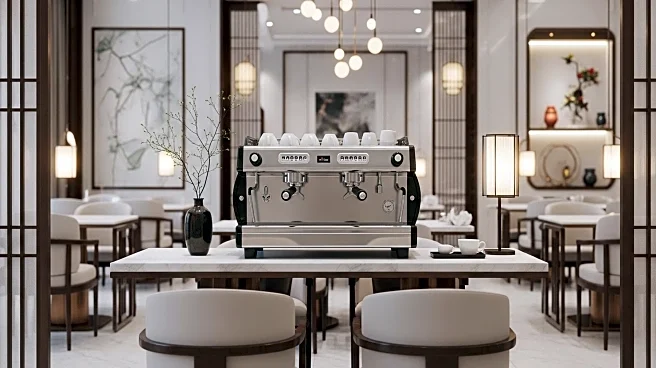What's Happening?
Luxury fashion brands such as Coach, Ralph Lauren, Louis Vuitton, Dior, and Prada are expanding their presence in Asia by opening cafes alongside their retail stores. This strategy aims to connect with consumers, particularly Gen Z, who prioritize experiences over tangible purchases. Coach CEO Todd Kahn highlighted the importance of self-expression and community, which these cafes foster. The initiative includes unique offerings like Coach's 'chilli crab' ice cream, which has gained popularity through social media sharing. The cafes serve as a gateway to luxury, offering affordable experiences that complement high-end merchandise.
Why It's Important?
The move into experiential retail reflects a shift in consumer behavior, where experiences are increasingly valued over physical goods. This strategy allows luxury brands to tap into new markets and demographics, particularly younger consumers who are more inclined to share their experiences online. The cafes not only enhance brand visibility but also drive sales, as they provide a space for shoppers to relax, potentially increasing the time spent in stores and boosting merchandise sales. This approach could redefine how luxury brands engage with consumers, emphasizing community and experience over traditional retail models.
What's Next?
Coach plans to open more than 100 coffee shops globally in the next four years, indicating a significant investment in experiential retail. This expansion could lead to increased competition among luxury brands to offer unique and engaging experiences. As brands continue to innovate, we may see further integration of lifestyle elements into retail spaces, potentially influencing broader retail strategies across industries. Stakeholders, including investors and competitors, will likely monitor the success of these ventures to gauge their impact on sales and brand loyalty.
Beyond the Headlines
The integration of cafes into luxury retail spaces raises questions about the evolving definition of luxury and consumer expectations. As brands blur the lines between retail and lifestyle, they may face challenges in maintaining exclusivity while appealing to broader audiences. Additionally, the focus on experiences could lead to ethical considerations regarding consumerism and sustainability, as brands balance the desire for growth with responsible practices.








